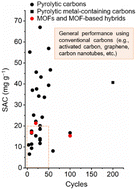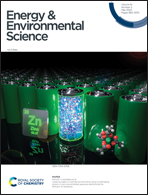Metal–organic framework derivatives for promoted capacitive deionization of oxygenated saline water
Abstract
Capacitive deionization (CDI) using porous materials is a sustainable method for providing affordable freshwater, but the low salt adsorption capacity and poor cycling stability of benchmark carbon materials significantly limit the practical implementation. Metal–organic framework (MOF) derivatives, such as pyrolytic carbons, pyrolytic metal-containing carbons, and MOF-based hybrids, have been designed as an alternative to conventionally used carbon materials. In particular, for the CDI of oxygenated saline water, which has always been a great challenge, MOF derivatives have also demonstrated enhanced salt adsorption capacity and cycling stability. MOF derivatives provide a new opportunity to significantly expand the library of advanced materials suitable for CDI technologies with improved performance.



 Please wait while we load your content...
Please wait while we load your content...